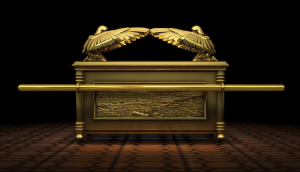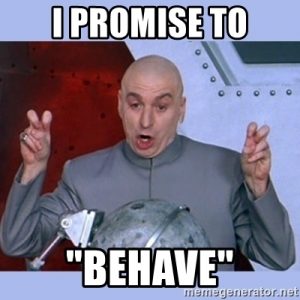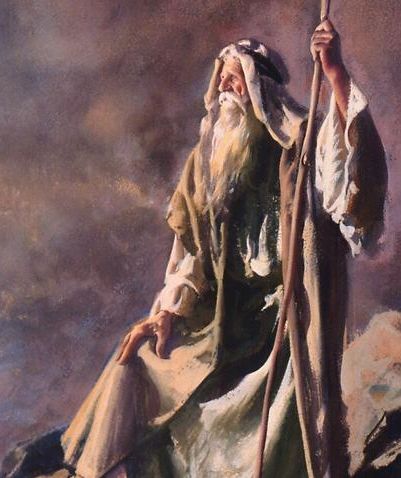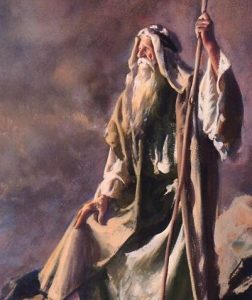Broken Promises and Renewed Vows
On the 6th of Sivan in the year 2448, the Yiddin married the RBSO. They also exchanged vows. The Yiddin promised to keep the Ten Commandments and a few other mitzvis they had received prior. Forty years later, in the year 2488, on either the 6th or 7th of the month of Adar, Moishe’s last day alive, he proposed a new set of vows. The Yiddin were to enter into a new covenant, the old one seemingly broken and shattered into many pieces by their bad behavior. Not too different than many marriages where vows are broken early on. Shoin, that for another day.
Did the Yiddin taka break the oral agreement, the covenant they entered into with the RBSO as they were standing under Har Sinai (Mt. Sinai)? Did they ever! Was there need for a second, or efsher a third covenant?
 Avada you recall that not forty days after they uttered the most famous phrase in Jewish history -the words “na’aseh v’nishma” (we will do and we will listen), they were back to their old way and habits. When they mistakenly thought Moishe was late coming off the mountain and was maybe dead, they sinned by creating the eygel hazohov (the golden calf), a sin we -according to many an exegete- continue to pay for today. Ober what has that sin to do with our very short (40 pisukim) parsha of Nitzovim which we read this coming shabbis? Let’s find out.
Avada you recall that not forty days after they uttered the most famous phrase in Jewish history -the words “na’aseh v’nishma” (we will do and we will listen), they were back to their old way and habits. When they mistakenly thought Moishe was late coming off the mountain and was maybe dead, they sinned by creating the eygel hazohov (the golden calf), a sin we -according to many an exegete- continue to pay for today. Ober what has that sin to do with our very short (40 pisukim) parsha of Nitzovim which we read this coming shabbis? Let’s find out.
Says the heylige Toirah (Devorim 29:9-12), azoy:
| 9. You are all standing this day before the Lord, your God the leaders of your tribes, your elders and your officers, every man of Israel, | טאַתֶּ֨ם נִצָּבִ֤ים הַיּוֹם֙ כֻּלְּכֶ֔ם לִפְנֵ֖י יְהֹוָ֣ה אֱלֹֽהֵיכֶ֑ם רָֽאשֵׁיכֶ֣ם שִׁבְטֵיכֶ֗ם זִקְנֵיכֶם֙ וְשֹׁ֣טְרֵיכֶ֔ם כֹּ֖ל אִ֥ישׁ יִשְׂרָאֵֽל: | |
| 10. your young children, your women, and your convert who is within your camp both your woodcutters and your water drawers, | יטַפְּכֶ֣ם נְשֵׁיכֶ֔ם וְגֵ֣רְךָ֔ אֲשֶׁ֖ר בְּקֶ֣רֶב מַֽחֲנֶ֑יךָ מֵֽחֹטֵ֣ב עֵצֶ֔יךָ עַ֖ד שֹׁאֵ֥ב מֵימֶֽיךָ: | |
| 11. that you may enter the covenant of the Lord, your God, and His oath, which the Lord, your God, is making with you this day, | יאלְעָבְרְךָ֗ בִּבְרִ֛ית יְהֹוָ֥ה אֱלֹהֶ֖יךָ וּבְאָֽלָת֑וֹ אֲשֶׁר֙ יְהֹוָ֣ה אֱלֹהֶ֔יךָ כֹּרֵ֥ת עִמְּךָ֖ הַיּֽוֹם: | |
| 12. in order to establish you this day as His people, and that He will be your God, as He spoke to you, and as He swore to your forefathers to Abraham, to Isaac, and to Jacob. | יבלְמַ֣עַן הָקִֽים־אֹֽתְךָ֩ הַיּ֨וֹם | ל֜וֹ לְעָ֗ם וְה֤וּא יִֽהְיֶה־לְּךָ֙ לֵֽאלֹהִ֔ים כַּֽאֲשֶׁ֖ר דִּבֶּר־לָ֑ךְ וְכַֽאֲשֶׁ֤ר נִשְׁבַּע לַֽאֲבֹתֶ֔יךָ לְאַבְרָהָ֥ם לְיִצְחָ֖ק וּלְיַֽעֲקֹֽב: |
 Shoin, on the last day of his life- so Rashi tells us- Moishe decided it was a time for the Yiddin to renew their vows with the RBSO. Were they broken? Did the RBSO ask for a new set of vows? Why was Moishe now discussing a new covenant? And what was the process for establishing new vows? Let’s find out.
Shoin, on the last day of his life- so Rashi tells us- Moishe decided it was a time for the Yiddin to renew their vows with the RBSO. Were they broken? Did the RBSO ask for a new set of vows? Why was Moishe now discussing a new covenant? And what was the process for establishing new vows? Let’s find out.
Avada you recall or should that our Zeyda Avrohom entered into a covenant with the RBSO. This was accomplished when the contracting parties passed between two halves of a slaughtered animal. Of course this makes little sense to you, ober that’s what the heylige Toirah tells us took place. Of course the RBSO passed by but metaphorically.
Ober this week, following the 98 curses and a few blessings which Moishe presaged (all in last week’s parsha), while the Yiddin stood on two different mountains (efsher symbolizing a covenant), Moishe tells the Yiddin it’s time to enter into a covenant with the RBSO. What happened to the prior covenant? Seemingly it was broken; over and out. As mentioned above, it was either broken when the Yiddin decided to create a new god in the form of a calf, or….was broken when Moishe -in disgust- and after witnessing how the Yiddin were behaving -dancing and reveling around the golden calf- threw the Luchois (Tablets) to the ground where they shattered. We are taught that the letters flew back up to shomayim (heaven) and shoin… ois covenant (it was broken). Was that the reason for a new one? Some say yes. Others beg to differ and say there were other reasons why Moishe was attending to this detail on the last day of his life. And instead of saying goodbye to his eishes chayil (wife) and kids -remember them?-, he was busy making and establishing a new covenant. What other reasons?
 Some say that the prior covenant, the one made at Har Sinai, was only for that generation of people who were there. Ober that generation was now all dead and shoin, a new one was in order. Another explanation proffered goes like this: this new covenant was meant to symbolize that entry into the Promised Land and its subsequent inhabitance (after killing or chasing all the goyim out) would only be successful and possible if they entered into a new agreement, a new covenant with the RBSO where they promised to behave and follow all the laws.
Some say that the prior covenant, the one made at Har Sinai, was only for that generation of people who were there. Ober that generation was now all dead and shoin, a new one was in order. Another explanation proffered goes like this: this new covenant was meant to symbolize that entry into the Promised Land and its subsequent inhabitance (after killing or chasing all the goyim out) would only be successful and possible if they entered into a new agreement, a new covenant with the RBSO where they promised to behave and follow all the laws.
Ober some say that Moishe had another plan in mind. He knew that if he, acting as but the agent of the RBSO entered into a new covenant, the Yiddin could not be held as accountable as they were under a covenant entered into directly with the RBSO. The one at Har Sinai was more serious and hence the Yiddin were severely punished for breaking it. Were they ever!
The bottom line: whatever the reason, Moishe -efsher on his own and efsher under direction from the RBSO -and aren’t we taught that everything Moishe did and said was under direction of the RBSO? – decided that the old covenant was in need of renewal. The Yiddin, those whom he shepherded out of Mitzrayim (Egypt) and tried keep control over during their forty year midbar experience, were not rule followers. They were a stiff necked people. 24,000 were stiff elsewhere, if you chap, and were eliminated. They did not follow the rules. In fact, most -kimat all- men between 20 and 60 during the 2nd year of the midbar experience, were already dead. Timing was good for vow renewal. Mistama, more than a few marriages can be saved with vow renewal at the right time.
Welcome then to Parshas Netzovim, always read on the last shabbis before Rosh Hashono, and its 40 pisukim (sentences), the second shortest in the gantza Toirah which this year, unlike last, we will read without its sometime sister parsha of Vayeilech, and as a result , also mistama get out of shul quite early. Even Rabbis who enjoy listening to themselves pontificate will not be too longwinded: zicher they’re already consumed with delivering great moving droshos (speeches) during the coming high holy days, also known as fundraising season. Avada there are pearls of wisdom to be found in the 657 words that make up this kurtze parsha (short) and our tafkid (charge) is zicher to find them.
And since Netzavim is the last parsha we’ll have the pleasure of hearing this year, efsher you’re wondering about the last three parshas in the heylige Toirah. How could the year be over when we’ve only read 51 of 54 parshas? Where are the other three, and why are they left out of the annual reading? Taka excellent kashas. Nu, Let’s begin then with a shtikel conversation for the shabbis tish that’s interesting and simple enough for the average Oisvorf to chap. Avada you know that Rosh Hashono, which begins Sunday evening this year, marks the new year, and efsher you would have thought that we would be completing the Toirah cycle this shabbis, the last of the year. Had you taka had this machshovo (thought), davka you would have been on your game ober since you’re an oisvorf who is mistama busy chapping arein a few (dozen) loi-sah-says (thou shall not dos) before year end and before the tshuva season begins in earnest, mistama you didn’t think about it. How can we complete the year without completing the heylige Toirah cycle? What’s taka pshat? And the short answer is that though the year is over and done, all the machinations of the Parsha readings must somehow align with Simchas Toirah, which is already next year, when we must read the last Parsha of V’zois Habrocho (Parsha #54). Veyter. What happens then beginning this Shabbis of Netzovim up until Simchas Toirah is some juggling of the parshas depending on when Rosh Hashono falls during the week, and aslo, if there’s an extra shabbis between Yoim Kippur and Succois. You chap all that? Mistama not, and next year if Netzovim and Vayelech are read together, we’ll cover the topic more biarechus (at length). The bottom line for this year: Netzovim and next week’s parsha of Vayelech are read separately. Enjoy the short laining and early dismissal.
 Who’s to blame for all this confusion? That same fellow Ezra, the great scribe we mentioned just last week. He of great fame who arranged for Ki Sovoy and its harsh rebukes to be read last week, also arranged for Netzovim to be read always, the last shabbis of the year. Says the heylige Gemora (Megillah 31B,) that Ezra instituted that Parshas Netzovim be read as a buffer between the curses of Ki Sovoy and the holiday of Rosh Hashono when tshuva is reviewed by the RBSO. What was Ezra thinking?? Ver veyst. Mistama he wanted to scare the living daylights out of us, which, if you listened carefully last week, zicher he did. Shoin! Soon we’ll see what the Medrish has to say about this arrangement.
Who’s to blame for all this confusion? That same fellow Ezra, the great scribe we mentioned just last week. He of great fame who arranged for Ki Sovoy and its harsh rebukes to be read last week, also arranged for Netzovim to be read always, the last shabbis of the year. Says the heylige Gemora (Megillah 31B,) that Ezra instituted that Parshas Netzovim be read as a buffer between the curses of Ki Sovoy and the holiday of Rosh Hashono when tshuva is reviewed by the RBSO. What was Ezra thinking?? Ver veyst. Mistama he wanted to scare the living daylights out of us, which, if you listened carefully last week, zicher he did. Shoin! Soon we’ll see what the Medrish has to say about this arrangement.
Parshas Netzovim seems to be the pre-season opener for the tshuva process. Said The Alter of Kelm, citing the Tur at the beginning of the laws of Rosh Hashono in the name of Rebbi Chanina and Rebbi Yehoishua azoy: Ordinarily an individual on trial for his life will not be concerned regarding his personal appearance before the court. He will not necessarily shave or get a haircut, nor dress in any other garments but black. In sharp contrast, Yiddin get haircuts, don white clothing, and eat and drink Yom Tov meals because they are confident that the RBSO will perform a miracle on their behalf. Seemingly, miracles are what many of us need to get by the judgment process.
Lommer endikin (let’s conculde) with a shtikel chazora of what took place just last shabbis. In our last episode of gloom and doom, Moishe warned the Yiddin of the giferliche consequences that would befall them were they to abandon the RBSO and his heylige Toirah. Mistama you’ve had nightmares thinking about the 98, count ‘em, different curses that Moishe laid out, double mamish the 49 he warned us about back in Parshas Bechukoiseyee, me too. After hearing those curses and knowing full well that many of you are deserving mamish of many if not al of them, efsher you’re klerring (maybe you’re thinking): does it even pay to continue shokeling and davening, and think about tshuva (repentance) by mumbling a few Selichois and getting ready for the big days ahead? Are we not doomed? Ver veyst, ober Raboyseyee, a new season begins this coming week and hope springs eternal as it approaches; we are hopeful. Weren’t you hopeful that this year, despite the long odds, the Mets would compile a winning record? Lehavdil, a new Parsha brings new hope and Parshas Netzavim, which you’ll hopefully enjoy hearing this shabbis, mostly because it’s so short, avada brings hope, it’s the pre-season opener.
A gittin Shabbis-
The Heylige Oisvorfer Ruv
Yitz Grossman

